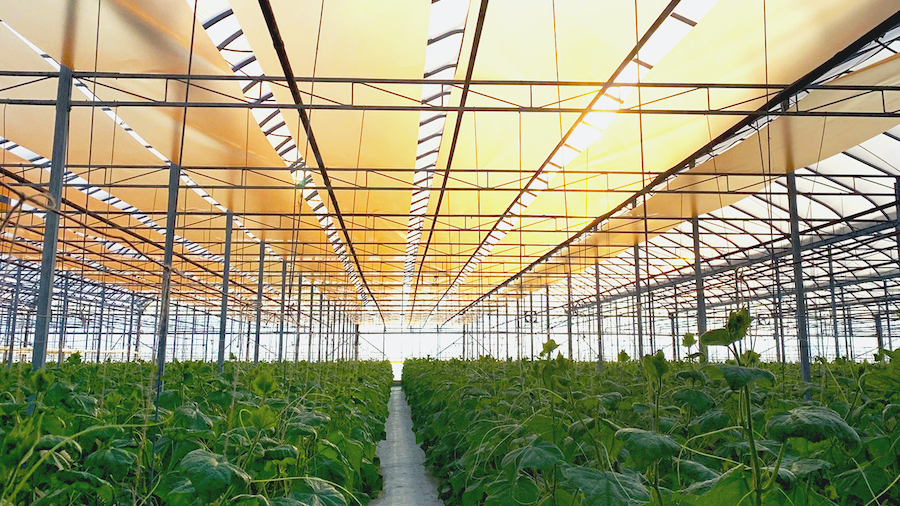UbiQD is developing “quantum dot” nanomaterial technology capable of manipulating light’s color and concentration, and one of its first applications will help crop productivity in greenhouse environments.
Subscribe to the Crunchbase Daily
The Los Alamos, New Mexico-based advanced materials company raised $7 million in a round of Series A funding co-led by Scout Ventures and Keiretsu Forum. They were joined by Sun Mountain Capital, Epic Ventures, Plug and Play Ventures and Arcview Collective Fund. UbiQD development partner Nanosys also joined the round as a strategic investor.
The round includes $4.5 million in new investment and $2.5 million in convertible notes, Hunter McDaniel, founder and CEO of UbiQD, told Crunchbase News.
The funding will be used to scale rollout of its first commercial product, UbiGro, and support development of other products, including additional “light recipes” customized for specific crops as well as those in particular geographic regions, he said.
How it works
The inspiration for the technology comes from electronic displays found on tablets, televisions and computer monitors. McDaniel started UbiQD in 2014 after seeing commercial partners face financial difficulties that kept them from developing the project.
Quantum dots are tiny semiconductor particles and, when ultraviolet light hits them, emit light of various colors. UbiQD has developed a proprietary formulation of quantum dots that is safer, more cost-effective and more durable than existing alternatives, McDaniel said. UbiGro, embeds quantum dots onto glass and pliable films to produce a layer of light that enables plants to use sunlight more efficiently.
“Early quantum dots were expensive, had toxic materials and there were issues with the material properties,” he said. “We solved those, from my perspective, and now they can be used more widely. We’ve zeroed in on where the problems are in the marketplace and focused there.”
In addition to enhancing crop productivity, UbiQD’s quantum dots are being used in clean energy production in urban environments, as well as to develop anticounterfeiting tools for the security industry.
Growth
UbiQD’s technology is deployed across six different countries, and is exiting a pilot phase and moving into the commercial phase, McDaniel said.
The company brought in $1 million in revenue last year and has been consistently doubling its growth in both revenue and employees.
“We are creating a new product category–we are the first to offer such a product for sale–so we have work to do to educate the market and prove that it does work,” he said. “This period is an inflection point for the business as we go from proof of concept to a growth-stage product. We have optimistic projections that the growth will get faster.”
McDaniel estimates the greenhouse industry has $250 billion in crop value, while there is another $25 billion in structures and equipment. Many have plastic film roofs–an $8 billion market–which is the area where he sees UbiQD having the biggest impact.
A few months ago, we reported that at that point in 2020, investors had put $4.1 billion of venture-backed dollars into 413 agriculture technology deals, and over the last five years have made $17.7 billion in investments, according to Crunchbase data.
McDaniel believes there is a broader microtrend here, given the major funding that went into agtech companies, including AppHarvest, which went public in September.
“These companies have been embraced by venture capital, and with food security, lack of mobility and more food delivered from the local farm becoming more important, we are part of that story,” he said. “We don’t operate greenhouses or produce the food, but we do have an appetite for this space and are positioned well to address it.”
What investors have to say
As part of the investment, Bradley Harrison from Scout Ventures, and Brian Lewis from Sun Mountain Capital, joined UbiQD’s board of directors.
Harrison said Scout looks for early-stage companies focused on “standout frontier technologies” and sees QbiQD falling into that column.
“Hunter has one of the most unique experiences in quantum dots,” said Harrison in an interview. “He trained under the man who essentially created them and has assembled an amazing team of fellow Ph.D.s that is diverse. The team has spent about six years understanding the way optimization of light impacts the yield and growth of plants, and we see them having substantial economic returns.”
Feature photo courtesy of UbiQD
Blogroll illustration: Dom Guzman

Stay up to date with recent funding rounds, acquisitions, and more with the Crunchbase Daily.



![Oct Calendar page being torn off to make way for Nov. [Dom Guman]](https://news.crunchbase.com/wp-content/uploads/oct-nov-300x168.jpg)




67.1K Followers